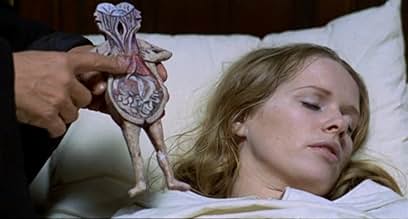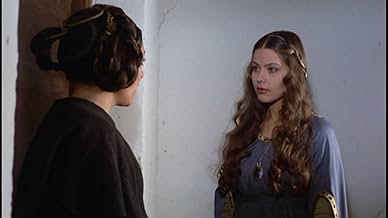अपनी भाषा में प्लॉट जोड़ेंA female vampire rises from her crypt every night in search of children as her victims.A female vampire rises from her crypt every night in search of children as her victims.A female vampire rises from her crypt every night in search of children as her victims.
José María Prada
- L'homme Mystérieux
- (as José Mª Prada)
José María Caffarel
- Le Médecin
- (as José Mª Caffarel)
फ़ीचर्ड समीक्षाएं
Michel Piccoli plays Richard, a nobleman whose wife Leonor (Liv Ullmann) dies fairly young. Some years later (although the film doesn't make this clear), he impulsively marries a much younger woman, Catherine (the luscious Ornella Muti). But he simply cannot get over the memory of Leonor, entering into a forbidding bargain with a charismatic stranger whom he meets near a bridge. The ramifications of the resurrected Leonor are chilling, as the local children start perishing. And all of this while The Plague is decimating the populace.
The fact that director Juan Bunuel is the son of the legendary Luis Bunuel will ensure that curiosity is raised among many interested viewers. The result here is one of those slow, stately foreign films that straddles the line between art house cinema and (not so traditional) horror stories. It has plenty of atmosphere and a very melancholy feel, so it's not something that one can just easily dismiss. Its wonderful international cast is very easy to watch, especially the enchanting Ms. Muti, whom many people will likely know best for the 1980 "Flash Gordon" feature film. Antonio Ferrandis is also excellent as the despairing Father Thomas.
"Leonor" is provocatively designed (by Enrique Alarcon), photographed (by Luciano Tovoli), and scored (by the great Ennio Morricone). It makes for rather potent entertainment, but people should be aware that the cheesy poster art does not really indicate the nature of the story. This is something far more serious and portentous. The bottom line is that if one admires the European art / horror films of the 1970s, they will find much to enjoy here. Leonard Maltin may have saddled it with his bottom-of-the-barrel "BOMB" rating, but in no way does it deserve that level of scorn.
Eight out of 10.
The fact that director Juan Bunuel is the son of the legendary Luis Bunuel will ensure that curiosity is raised among many interested viewers. The result here is one of those slow, stately foreign films that straddles the line between art house cinema and (not so traditional) horror stories. It has plenty of atmosphere and a very melancholy feel, so it's not something that one can just easily dismiss. Its wonderful international cast is very easy to watch, especially the enchanting Ms. Muti, whom many people will likely know best for the 1980 "Flash Gordon" feature film. Antonio Ferrandis is also excellent as the despairing Father Thomas.
"Leonor" is provocatively designed (by Enrique Alarcon), photographed (by Luciano Tovoli), and scored (by the great Ennio Morricone). It makes for rather potent entertainment, but people should be aware that the cheesy poster art does not really indicate the nature of the story. This is something far more serious and portentous. The bottom line is that if one admires the European art / horror films of the 1970s, they will find much to enjoy here. Leonard Maltin may have saddled it with his bottom-of-the-barrel "BOMB" rating, but in no way does it deserve that level of scorn.
Eight out of 10.
Although not strictly a vampire film, this is one of those interesting European combinations of horror and art, typified by "Daughters of Darkness" in the 70's or "Let the Right One In" more recently. The plot involves a a 14th century nobleman who loses his young wife (Liv Ullman) to a horseback-riding accident (and to primitive medical practices of the era). He re-marries and has children, but remains mired in grief and unable to forget his first wife (even though his new wife is played by a Ornella Muti, who would make most men forget their own name). Finally, in a kind of "Monkey's Paw" scenario he manages to actually will her back from the grave, but she's not the same, and a lot of local children begin to mysteriously disappear and it isn't long before his new family is threatened. . .
This is more an art film than a horror film, not surprisingly since it was directed by Luis Bunuel's son and features Ingemar Bergman's frequent lead actress and muse. It's more serious than a lot of Euro-horror films, realistically set against the background of the Black Death plague and seriously commenting on the prevailing superstitions of the time (i.e. the fool-hardy medical practices, the witch-burnings). The vampiric element is present mainly in the undead Ullman's predations on peasant children, which recalls the "Bloofer Lady" that the undead Lucy Westeridge becomes in Bram Stoker's original novel "Dracula", an element that has been left out of almost all the subsequent movie adaptations because it't just too disturbing. It's also really quite heartbreaking to see the maternal instinct so corrupted, and to see undying love gone so horribly wrong.
This movie has, unfortunately, kind of fallen through the cracks between art and horror. It is not as exploitative as Jean Rollins sex-and-blood-soaked vampire films, on one hand, but it is not quite as self-consciously arty as something like Ingemar Bergman's "Hour of the Wolf" either (if Bergman or the Bunuel father had simply put their NAME on this movie, it would no doubt be much more well-known today) . It deserves better though. Ulman and Piccolo are very good as the star-cursed lovers, and Ornella Muti is amazing (if WAY too beautiful to be forsaken for a dead woman). It is ripe material for a DVD release.
This is more an art film than a horror film, not surprisingly since it was directed by Luis Bunuel's son and features Ingemar Bergman's frequent lead actress and muse. It's more serious than a lot of Euro-horror films, realistically set against the background of the Black Death plague and seriously commenting on the prevailing superstitions of the time (i.e. the fool-hardy medical practices, the witch-burnings). The vampiric element is present mainly in the undead Ullman's predations on peasant children, which recalls the "Bloofer Lady" that the undead Lucy Westeridge becomes in Bram Stoker's original novel "Dracula", an element that has been left out of almost all the subsequent movie adaptations because it't just too disturbing. It's also really quite heartbreaking to see the maternal instinct so corrupted, and to see undying love gone so horribly wrong.
This movie has, unfortunately, kind of fallen through the cracks between art and horror. It is not as exploitative as Jean Rollins sex-and-blood-soaked vampire films, on one hand, but it is not quite as self-consciously arty as something like Ingemar Bergman's "Hour of the Wolf" either (if Bergman or the Bunuel father had simply put their NAME on this movie, it would no doubt be much more well-known today) . It deserves better though. Ulman and Piccolo are very good as the star-cursed lovers, and Ornella Muti is amazing (if WAY too beautiful to be forsaken for a dead woman). It is ripe material for a DVD release.
This film is a fairly faithful adaptation of the Gothic short story "Wake Not The Dead" by Ernst Raupach (which is misattributed to Ludwig Tieck in many sources, including the opening credits of this film). Definitely read the source material before you watch the film, and your enjoyment of the film will be much greater. Of course, as is often the case, the short story is better, and the few ways in which this film diverges from the original story are detrimental to the film. Nevertheless, it is overall very faithful to the tone and message of Raupach. It has a lovely Medieval setting and Gothic tone.
Don't expect 70s Eurohorror in the vein of Jess Franco and the like, and don't expect anything ingenious like the efforts of the director's father. It's a loose adaptation of motives by early romanticist Ludwig Tieck, and since there was no vampirism in literature back then, THERE ARE NO VAMPIRES IN THIS MOVIE EITHER! Just Liv Ullman coming back from the dead after 10 years and strangling children. Great locations, good acting, but neither a convincing drama nor a satisfying horror film. But I've seen much worse than that and young Ornella Muti's a treat. And I like the fact that some screenwriters of the seventies got back to classic seldom filmed literature (like Ado Kyrou did in the far superior 'Le Moine') instead of copying plotlines, themes and motives that have been used a thousand times before.
There are no vampires here, the synopsis given here is incorrect. What you get is a devastating film that details a love lost but never forgotten, and what happens when that lost love returns 10 years later resulting in murder, chaos and violence. Even more impressive, the film does not resort to nudity or gore to keep the viewer's attention. The cast is excellent, the script and story are fresh and inventive, and the direction hits all the right notes. Truly a one of a kind horror film, absolutely NOT for the slasher / torture porn crowd. The Magnetic video from 1980 contains the 85 min English dubbed version. The IMDb lists 100 min for the Spanish version, which is set for DVD release in June 2008. The dubbing is above average and nothing seems missing from the 85 min version, but I'm curious about the Spanish DVD when it comes out. This could be the ultimate art house horror!
टॉप पसंद
रेटिंग देने के लिए साइन-इन करें और वैयक्तिकृत सुझावों के लिए वॉचलिस्ट करें
- How long is Leonor?Alexa द्वारा संचालित
विवरण
- रिलीज़ की तारीख़
- कंट्री ऑफ़ ओरिजिन
- आधिकारिक साइट
- भाषाएं
- इस रूप में भी जाना जाता है
- Leonor, the Devil's Mistress
- उत्पादन कंपनियां
- IMDbPro पर और कंपनी क्रेडिट देखें
इस पेज में योगदान दें
किसी बदलाव का सुझाव दें या अनुपलब्ध कॉन्टेंट जोड़ें





























